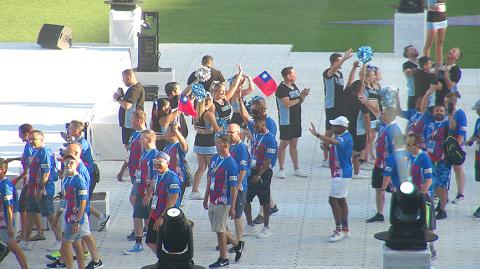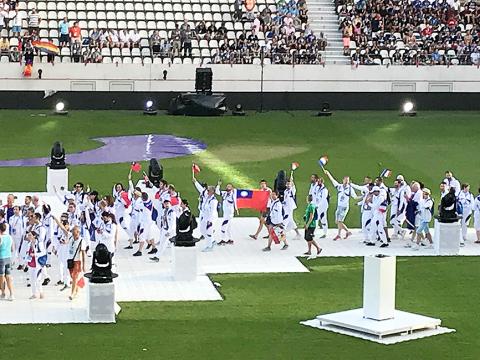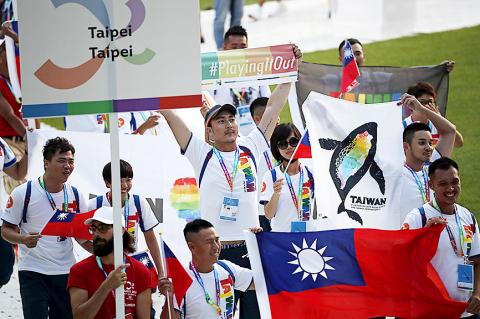Taiwanese athletes on Saturday marched in the opening ceremony of the Gay Games in Paris, waving the Republic of China (ROC) flag and a carrying a banner that read, “The first Asian country to legalize gay marriage: Taiwan.”
However, spectators and participants at the ceremony, including members of team France and team San Fransisco, also waved ROC flags that they obtained from Taiwanese athletes as a show of support for the nation.
Although Taiwanese athletes had previously participated individually in the Games, this year is the first time a national team was sent to the event.

Photo: CNA
The team is comprised of 18 athletes competing in categories including speed roller skating, tennis, swimming and table tennis.
As the Games are not organized by nationality, athletes carried various national and regional flags as well as rainbow flags at the opening ceremony at the Stade Jean Bouin.
US participants were grouped by local affiliations such as San Fransisco, New York and Washington.

Photo: CNA
Organizers of the Games late last month changed the Taiwanese team’s name on its Web site from “Taiwan” to “Taipei.”
The French softball team took scores of ROC flags, said Yang Chih-chun (楊智群), team leader and Gay Sports and Taiwan Gay Development Movement Association president.
“They said using the name ‘Taipei’ is disrespectful to the people of Taiwan. We are certainly grateful for their help,” Yang said.

Photo: EPA
Swimmer and team co-leader Yu Kun-i (游坤義) said that Team Taiwan would not shy away from using the ROC flag, as other teams were flying their national flags as they pleased.
“The organizers do not provide flags for participants, because they want to show their respect for the way the teams choose to represent themselves,” he said.
Most importantly, the team wants to advertise that Taiwan is the first Asian nation to allow same-sex marriage, Yu said.
“For us, Taiwan represents the values of our group and society,” he added.
The organizers have unofficially told the team that they would not interfere with how Team Taiwan represents itself in the arena, because Taiwan stands for human rights, democracy and freedom, he said.
The team in its promotional materials used the bajiajiang (eight generals, 八家將) from Taiwanese folk religion to showcase Taiwan’s local culture, Yu said.
The generals’ faces are painted in the colors of the rainbow and half of their faces are covered to symbolize gay pride and coming out of the closet, he said.
Australian and Canadian participants told the team that they know that the real name of the team is “Taiwan” and conveyed their sympathy for the name change, a Team Taiwan supporting staff member said.
The Games are the 10th iteration of the event held once every four years and are sponsored by the French Presidency, the French Ministry of Culture, the French Ministry of Youth Affairs and Sports, and the city of Paris.
The Games, which opened on Saturday, would run through Sunday and have attracted 10,317 participants from 91 nations to compete in 36 categories.
The organizers are expecting 300,000 spectators to attend the Games.
Additional reporting by Lu Yi-hsuan

MAKING WAVES: China’s maritime militia could become a nontraditional threat in war, clogging up shipping lanes to prevent US or Japanese intervention, a report said About 1,900 Chinese ships flying flags of convenience and fishing vessels that participated in China’s military exercises around Taiwan last month and in January last year have been listed for monitoring, Coast Guard Administration (CGA) Deputy Director-General Hsieh Ching-chin (謝慶欽) said yesterday. Following amendments to the Commercial Port Act (商港法) and the Law of Ships (船舶法) last month, the CGA can designate possible berthing areas or deny ports of call for vessels suspected of loitering around areas where undersea cables can be accessed, Oceans Affairs Council Minister Kuan Bi-ling (管碧玲) said. The list of suspected ships, originally 300, had risen to about

DAREDEVIL: Honnold said it had always been a dream of his to climb Taipei 101, while a Netflix producer said the skyscraper was ‘a real icon of this country’ US climber Alex Honnold yesterday took on Taiwan’s tallest building, becoming the first person to scale Taipei 101 without a rope, harness or safety net. Hundreds of spectators gathered at the base of the 101-story skyscraper to watch Honnold, 40, embark on his daredevil feat, which was also broadcast live on Netflix. Dressed in a red T-shirt and yellow custom-made climbing shoes, Honnold swiftly moved up the southeast face of the glass and steel building. At one point, he stepped onto a platform midway up to wave down at fans and onlookers who were taking photos. People watching from inside

Japan’s strategic alliance with the US would collapse if Tokyo were to turn away from a conflict in Taiwan, Japanese Prime Minister Sanae Takaichi said yesterday, but distanced herself from previous comments that suggested a possible military response in such an event. Takaichi expressed her latest views on a nationally broadcast TV program late on Monday, where an opposition party leader criticized her for igniting tensions with China with the earlier remarks. Ties between Japan and China have sunk to the worst level in years after Takaichi said in November that a hypothetical Chinese attack on Taiwan could bring about a Japanese

STREAMLINED: The dedicated funding would allow the US to transfer equipment to Taiwan when needed and order upgraded replacements for stockpiles, a source said The US House of Representatives on Thursday passed a defense appropriations bill totaling US$838.7 billion, of which US$1 billion is to be allocated to reinforcing security cooperation with Taiwan and US$150 million to replace defense articles provided to the nation. These are part of the Consolidated Appropriation Act, which the US House yesterday passed with 341 votes in favor and 88 against. The act must be passed by the US Senate before Friday next week to avoid another government shutdown. The US House Committee on Appropriations on Monday unveiled the act, saying that it allocates US$1 billion for the Taiwan Security Cooperation Initiative